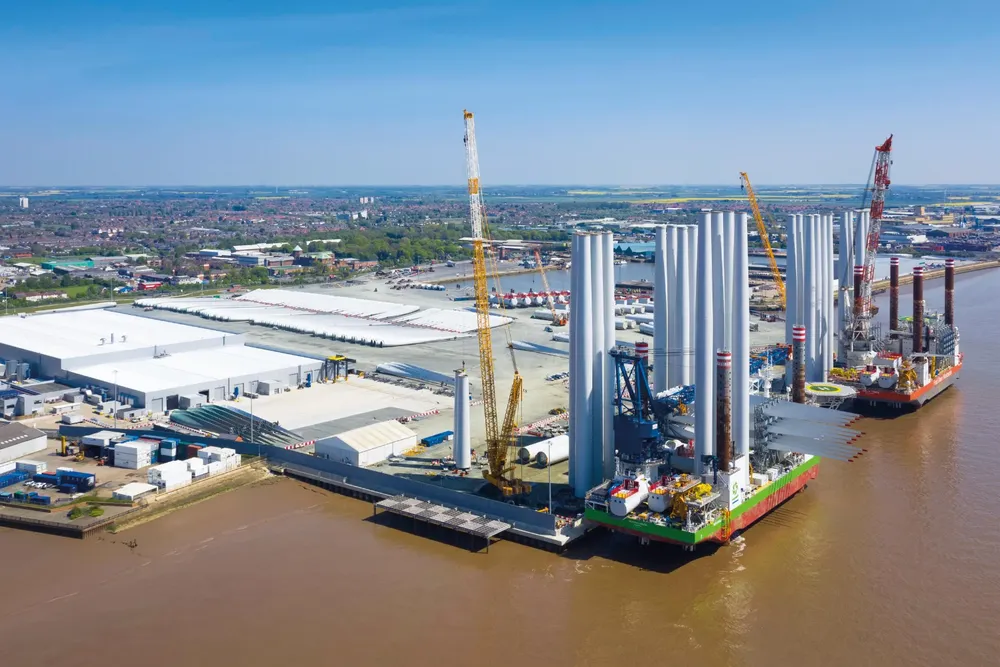Trump tariffs would have 'significant impact' on US wind rollout
Vestas and Siemens Gamesa are among key European suppliers to US wind sector

US tariffs on Canada, Mexico and China will have a “significant impact” on US wind projects offshore and onshore as well as pushing up energy prices in the country across the board, say industry experts.
The Trump Administration announced this weekend that it is implementing previously threatened 25% tariffs on imports from Canada and Mexico, except for a lower 10% on Canadian “energy resources”. China is subject to 10% in addition to existing tariffs.
Those countries have all vowed to respond to the US measures with a combination of tariffs and legal challenges.
American Clean Power Association CEO Jason Grumet warned that tariffs on America’s three largest trading partners “will put upward pressure on consumer energy costs and diminish our capacity to unleash energy abundance.”
“While the fuel relied upon by wind and solar energy – complemented by battery storage – is free, some parts for these machines that harness these renewable resources are manufactured in Canada and Mexico.”
“Significant progress” has been made in manufacturing those components in the US, he said, with the USMCA free trade agreement the US shares with its North American neighbours “a positive factor in lowering American energy costs.”
The Trump Administration has said it is implementing the tariffs in response to the “extraordinary threat posed by illegal aliens” – as the US refers to refugees and migrants – and the import of drugs, particularly the deadly opioid fentanyl.
“The ACP and its member companies share the Trump Administration’s concern over the fentanyl crisis and public health emergency impacting our communities,” said Grumet, while also supporting Trump’s “commitment to lower American energy prices.”
“While energy production only represents 5% of our nation’s direct GDP, it drives the productivity of our entire economy, impacting prices of nearly all consumer goods,” said Grumet.
Consultancy Wood Mackenzie warned last month that 25% tariffs on imports from Canada and Mexico would have “huge impacts on oil and gas markets and energy supply chains.”
Trump himself has said on the impact of his tariffs: “We may have short term some little pain, and people understand that. But long term, the United States has been ripped off by virtually every country in the world,”
'Tariffs will push up costs for US offshore wind projects'
Shares in major wind turbine suppliers including Vestas, GE Vernova, Goldwind and Siemens Gamesa owner Siemens Energy all dropped around 3-4% on the opening of markets today.
Adrian de Andres, director of renewables growth at Xodus Group, said: "The new tariffs are expected to have a significant impact on US offshore wind projects. These projects heavily depend on global supply chains from Asia, Europe, and other American countries.”
“Consequently, any tariffs imposed will affect their Capex and Opex budgets, leading to substantial impacts on their business cases,” said de Andres, who was until recently chief operating officer for offshore wind at Irish developer Simply Blue.
If a Chinese turbine were to be used on a US offshore wind project, he said the new tariff would mean a Capex increase of around 4% and a levelised cost of energy (LCOE) increase of around 2%.
Trump has also said the European Union is “definitely” in line for tariffs “pretty soon,” complaining of a purported $300bn trade deficit with the bloc. "They don't take our cars, they don't take our farm products. They take almost nothing,” he said, adding that the EU is “really out of line.”
De Andres said that, for the offshore wind sector at least, the impact of US tariffs on the EU would be “relatively minor” for projects in the bloc. These are “generally more reliant on European and Asian supply chains, making them largely independent of American imports.”
Onshore impact as key materials rise
Deepak Chinnapa, director at Danish wind power consultancy Brinckmann Group, agreed that the tariffs will have a "significant" impact on wind power in the US. Onshore wind in the US could be hit "especially" hard, in his view, as it has enjoyed years of low LCOE.
Tariffs on key materials such as steel and aluminium will "certainly increase production costs," while the threat of retaliation from the other countries poses an "increased risk on US projects" as local supply is "not sufficient to meet current US demand."
"Most companies across the supply chain doing business in the US will be impacted given that the industry relies on a globally interconnected setup. Costs will increase and we could also expect further disruptions as various components (e.g., blades, nacelles and gearboxes) are sourced from a number of these markets."
Higher LCOE and Capex costs for wind projects will make them "less competitive" compared to other energy sources, he said. This could potentially delay projects as developers reconsider their supply claims and slow down the rollout of wind power across the board, he added.
“The US’s unilateral tariff hikes severely violate [World Trade Organization] rules. This move cannot solve the US's problems at home and more importantly, does not benefit either side, still less the world.”
(Copyright)